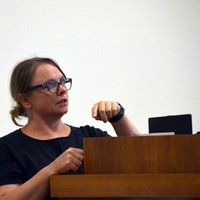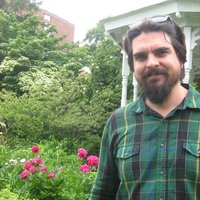Monographs by Samuel Lindholm
Jean Bodin and Biopolitics Before the Biopolitical Era
Thesis & Dissertation by Samuel Lindholm

JYU DISSERTATIONS , 2022
While the number of studies on biopolitics, the literal power over life (bios), continues to grow... more While the number of studies on biopolitics, the literal power over life (bios), continues to grow, some parts of Michel Foucault’s original analysis have remained virtually unchallenged. For example, only a few thinkers have managed to contest his claim of biopolitics as an exclusively modern phenomenon. This current study aims to take part in the ongoing discussions concerning the history of biopolitics and the connection between life-optimizing biopolitics and the technology of sovereign power, which either disregards life or negates it altogether. We approach these topics by analyzing Jean Bodin’s political thought, which acts as a prime example of early modern biopolitics. What makes Bodin’s political works especially interesting is the fact that they appear to exemplify both sovereign power and biopolitics. We examine these issues by combining Foucauldian genealogy with political theory and intellectual history.
Bodin is a “populationist” who believes that the high number of citizens ought to be considered as the greatest wealth and strength of a commonwealth. The Angevin author is also interested in controlling the quality of the people with a magistracy of censors that purges undesirable individuals out of the commonwealth. Furthermore, he adopts other ancient and medieval ideas, such as those on climates, humors, and temperaments, which he believes hold considerable political weight. Bodin, who writes at the peak of the European witch hunts, maintains that sorcerers and sorceresses were behind many deaths, abortions, and even the fall of states. This problem includes a (bio)political element; purging the witches equates to safeguarding the people, the commonwealth, and the whole of humankind.
Establishing a biopolitical reading of Bodin’s texts allows us to take part in two additional discussions concerning the notion of biopolitics. Firstly, we assert that Giorgio Agamben’s equation of sovereign power and biopolitics is invalid. Bodin’s political thought proves that the two technologies can co-exist while maintaining their conceptual distinction. Secondly, we argue that Foucault is mistaken to presume that biopolitics is an explicitly modern occurrence. We argue that Bodin acts as a prime example of what could be described as biopolitics before the “biopolitical era” of modernity as defined by Foucault.
Papers by Samuel Lindholm
Article, 2024
Luther and Biopower: Rethinking the Reformation with Foucault
Routledge eBooks, Jul 13, 2023
Routledge eBooks, Jul 13, 2023
Routledge eBooks, Jul 13, 2023
Routledge eBooks, Jul 13, 2023
Routledge eBooks, Jul 13, 2023
Routledge eBooks, Jul 13, 2023
Routledge eBooks, Jul 13, 2023

History of the Human Sciences, Apr 19, 2023
Thomas Hobbes's name often comes up as scholars debate the history of biopower, which reg... more Thomas Hobbes's name often comes up as scholars debate the history of biopower, which regulates the biological life of individual bodies and entire populations. This article examines whether and to what extent Hobbes may be regarded as the first biopolitical philosopher. I investigate this question by performing a close reading of Hobbes's political texts and by comparing them to some of the most influential theories on biopolitics proposed by Michel Foucault, Giorgio Agamben, Roberto Esposito, and others. Hobbes is indeed the first great thinker to assert the supreme political importance of safeguarding life. Furthermore, this prominence of non-contemplative life is not limited to mere survival but also seeks to allow for the people's happiness. This may indeed allow us to consider him as the first biopolitical philosopher, at least in some limited capacity. However, the Englishman's biopolitical stance lacks the practical aspects seen in examples of ‘properly modern’ biopolitics. Moreover, peoples’ lives were already governed radically in antiquity. I argue that Hobbes's biopolitical system was, therefore, minimal in the sense of a ‘biopolitical nightwatchman state’. However, he acted as an undeniable catalyst to the ‘properly biopolitical era of modernity’, when mundane life and happiness became the explicit main objects of virtually all politics.
Politiikka
Kirjoitus perustuu väitöstilaisuudessa pidettyyn lektioon.

Debating Biopolitics New Perspectives on the Government of Life, 2022
This chapter offers a biopolitical reading of Jean Bodin’s famous contributions to climate theory... more This chapter offers a biopolitical reading of Jean Bodin’s famous contributions to climate theory, which provides an important key to understanding his larger political thought. Even though Bodin draws from ancient and medieval sources, his approach is considered unique because of his original claim that the suitable form of the commonwealth varies according to its location. Bodin is also fascinated by the alleged effects that the distinct milieus have on issues such as sex, health, madness, and politics. Even though the environment cannot determine its inhabitants’ behaviour entirely, it has a significant influence on the people’s dispositions, which may still be altered somewhat through the right discipline. Therefore, in Bodin, biopolitics manifests itself in a two-fold manner: on the one hand, commonwealths ought to be established according to nature (literal bodily fluids); on the other, the ensuing inclinations can also be altered through smart political interventions. Keywords: Jean Bodin, biopolitics, climate theory, humourism, temperaments
Popularized articles by Samuel Lindholm
Book Reviews by Samuel Lindholm











Uploads
Monographs by Samuel Lindholm
Thesis & Dissertation by Samuel Lindholm
Bodin is a “populationist” who believes that the high number of citizens ought to be considered as the greatest wealth and strength of a commonwealth. The Angevin author is also interested in controlling the quality of the people with a magistracy of censors that purges undesirable individuals out of the commonwealth. Furthermore, he adopts other ancient and medieval ideas, such as those on climates, humors, and temperaments, which he believes hold considerable political weight. Bodin, who writes at the peak of the European witch hunts, maintains that sorcerers and sorceresses were behind many deaths, abortions, and even the fall of states. This problem includes a (bio)political element; purging the witches equates to safeguarding the people, the commonwealth, and the whole of humankind.
Establishing a biopolitical reading of Bodin’s texts allows us to take part in two additional discussions concerning the notion of biopolitics. Firstly, we assert that Giorgio Agamben’s equation of sovereign power and biopolitics is invalid. Bodin’s political thought proves that the two technologies can co-exist while maintaining their conceptual distinction. Secondly, we argue that Foucault is mistaken to presume that biopolitics is an explicitly modern occurrence. We argue that Bodin acts as a prime example of what could be described as biopolitics before the “biopolitical era” of modernity as defined by Foucault.
Papers by Samuel Lindholm
Popularized articles by Samuel Lindholm
Book Reviews by Samuel Lindholm
Bodin is a “populationist” who believes that the high number of citizens ought to be considered as the greatest wealth and strength of a commonwealth. The Angevin author is also interested in controlling the quality of the people with a magistracy of censors that purges undesirable individuals out of the commonwealth. Furthermore, he adopts other ancient and medieval ideas, such as those on climates, humors, and temperaments, which he believes hold considerable political weight. Bodin, who writes at the peak of the European witch hunts, maintains that sorcerers and sorceresses were behind many deaths, abortions, and even the fall of states. This problem includes a (bio)political element; purging the witches equates to safeguarding the people, the commonwealth, and the whole of humankind.
Establishing a biopolitical reading of Bodin’s texts allows us to take part in two additional discussions concerning the notion of biopolitics. Firstly, we assert that Giorgio Agamben’s equation of sovereign power and biopolitics is invalid. Bodin’s political thought proves that the two technologies can co-exist while maintaining their conceptual distinction. Secondly, we argue that Foucault is mistaken to presume that biopolitics is an explicitly modern occurrence. We argue that Bodin acts as a prime example of what could be described as biopolitics before the “biopolitical era” of modernity as defined by Foucault.